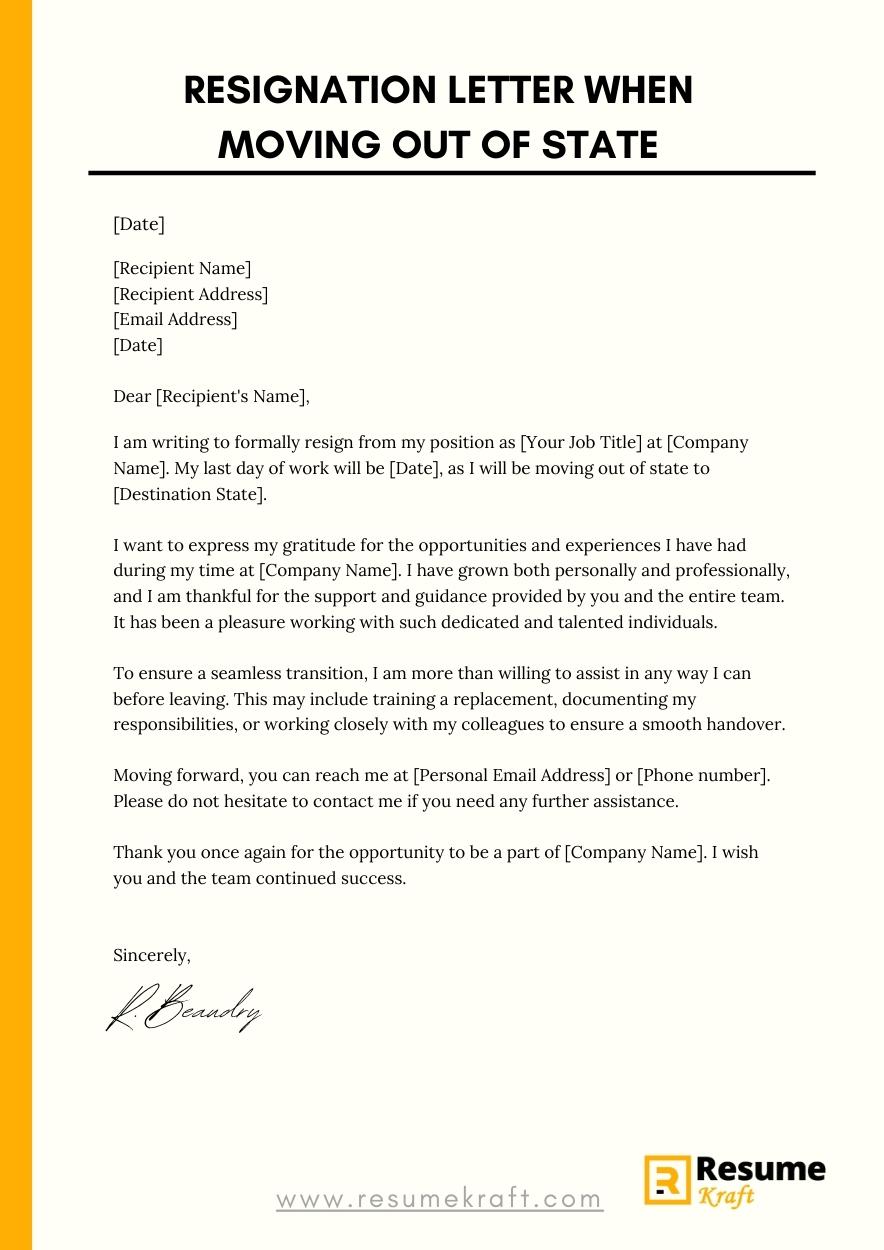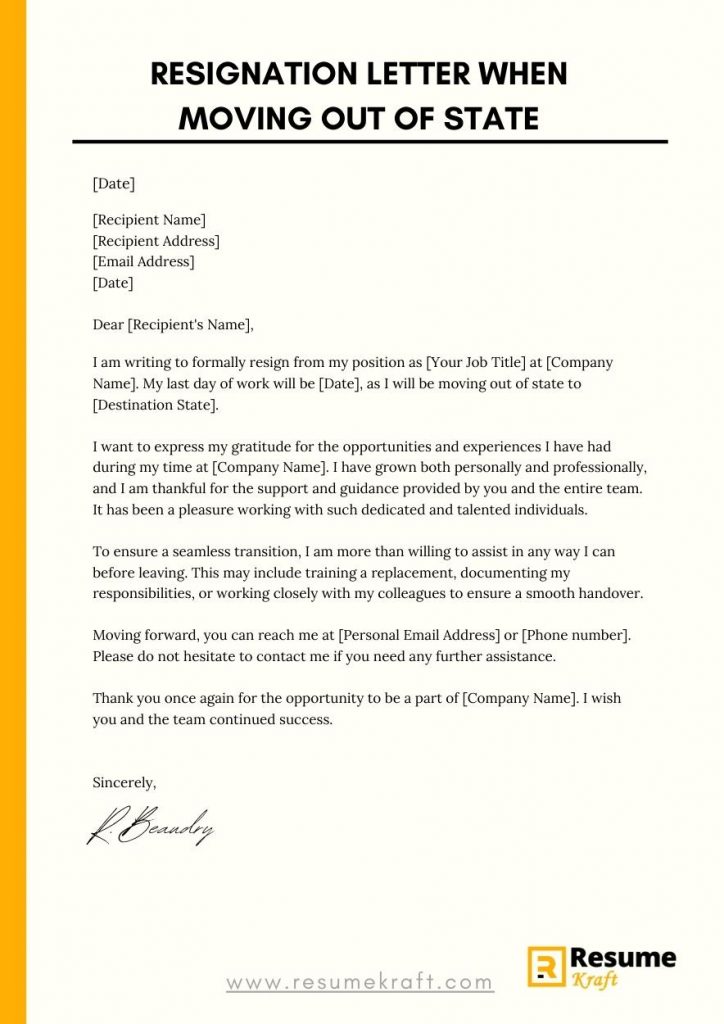
When life takes you to a different state, it may be necessary to resign from your current job and start fresh in your new location. Writing a resignation letter is an important step in the process, as it formalizes your departure and ensures a smooth transition for both you and your employer. In this guide, we will provide you with a step-by-step approach to writing a resignation letter when moving out of state, along with two sample letters to help you get started.
- What To Include in a Resignation Letter When Moving Out of State
- What Not to Include in Your Resignation Letter When Moving Out of State
- How To Format a Resignation Letter When Moving Out of State
- Resignation Letter Sample When Moving Out of State (Printed Letter)
- Resignation Letter Sample When Moving Out of State (Email Resignation Letter)
- Key Takeaways
- Frequently Asked Questions
- Conclusion
What To Include in a Resignation Letter When Moving Out of State
When drafting your resignation letter, it’s important to include certain key elements to ensure clarity and professionalism. Here’s what you should include:
1. Your Intent to Resign
Clearly state your intention to resign from your current position. Begin the letter by addressing your immediate supervisor or manager and let them know that you will be stepping down from your role.
2. The Effective Date of Your Resignation
Specify the date when your resignation will take effect. This will allow your employer to plan for your departure and start the process of finding a replacement if needed. It’s ideal to provide at least two weeks’ notice to allow for a smooth transition.
3. Reason for Resignation (Optional)
While it is not mandatory, including a brief explanation of your reason for resigning can be beneficial. If you are moving out of state, it is helpful to mention this as the reason for your departure. However, keep it brief and professional.
4. Gratitude and Appreciation
Express gratitude for the opportunities and experiences you have had during your tenure with the company. Highlight any specific accomplishments or positive aspects of the job that you have enjoyed. This will leave a positive impression and maintain good professional relationships.
5. Offer to Assist in the Transition
Make it clear that you are willing to assist in the transition process before your departure. Offer to train your replacement, create a document outlining your responsibilities, or perform any other tasks that will make the transition smoother for your colleagues and employer.
6. Contact Information
Include your contact information in the letter, such as your personal email address and phone number. This will allow your employer to reach out to you if needed, even after you have moved out of state.
What Not to Include in Your Resignation Letter When Moving Out of State
While it is important to include certain elements in your resignation letter, there are also things you should avoid. Here’s what not to include:
1. Negative Remarks or Criticism
Regardless of your reasons for leaving, it is important to maintain professionalism and avoid criticizing the company or your colleagues in your resignation letter. Keep the tone positive and focus on expressing gratitude instead.
2. Personal Details
Avoid including personal details or reasons for your move that are unrelated to your professional life. Stick to the facts and keep the letter focused on your resignation and the necessary details.
3. Lengthy Explanations
Keep your resignation letter concise and to the point. Avoid going into excessive detail about your reasons for leaving or your future plans. Remember, the purpose of the letter is to formally resign, not provide a comprehensive life update.
How To Format a Resignation Letter When Moving Out of State
Formatting your resignation letter appropriately is crucial to maintain a professional appearance. Here’s how to format your letter:
1. Use a Professional Tone
Maintain a professional and respectful tone throughout the letter. Address your supervisor or manager by their appropriate title and use a formal tone.
2. Use a Clear and Concise Structure
Divide your resignation letter into clear paragraphs, each focusing on a specific element. Use headings or subheadings to make it easy to navigate and understand.
3. Proofread and Edit Carefully
Before submitting your resignation letter, proofread it for any grammatical errors or typos. Edit it for clarity and ensure that the content is coherent and flows smoothly.
4. Use a Professional Letterhead (Printed Letter)
If you are submitting a printed resignation letter, use a professional letterhead that includes your name, address, phone number, and email address. Alternatively, you can include this information at the beginning or end of the letter.
5. Sender’s and Receiver’s Addresses (Printed Letter)
Include the sender’s address (your address) and the receiver’s address (company address) as part of the formal letter format. Place these addresses at the top of the letter, aligned to the left margin.
6. Subject Line (Email Resignation Letter)
If you are submitting your resignation letter via email, use a clear and concise subject line. For example, “Resignation – Your Name.” This will help ensure that your email is properly identified and filed.
Resignation Letter Sample When Moving Out of State (Printed Letter)

Printed Resignation Letter Sample
[Your Name]
[Your Address]
[City, State, ZIP Code]
[Phone number]
[Email Address]
[Date]
[Supervisor’s Name]
[Company Name]
[Company Address]
[City, State, ZIP Code]
Dear [Supervisor’s Name],
I am writing to formally resign from my position as [Your Job Title] at [Company Name]. My last day of work will be [Date], as I will be moving out of state to [Destination State].
I want to express my gratitude for the opportunities and experiences I have had during my time at [Company Name]. I have grown both personally and professionally, and I am thankful for the support and guidance provided by you and the entire team. It has been a pleasure working with such dedicated and talented individuals.
To ensure a seamless transition, I am more than willing to assist in any way I can before leaving. This may include training a replacement, documenting my responsibilities, or working closely with my colleagues to ensure a smooth handover.
Moving forward, you can reach me at [Personal Email Address] or [Phone number]. Please do not hesitate to contact me if you need any further assistance.
Thank you once again for the opportunity to be a part of [Company Name]. I wish you and the team continued success.
Sincerely,
[Your Name]
Resignation Letter Sample When Moving Out of State (Email Resignation Letter)
Subject: Resignation - [Your Name]
Dear [Supervisor's Name],
I hope this email finds you well. I am writing to inform you of my resignation from my current position as [Your Job Title] at [Company Name].
Due to personal circumstances, I will be relocating out of state to [Destination State]. Therefore, my last day of work will be [Date], which will allow sufficient time for a smooth transition.
I am truly grateful for the opportunities and support I have received during my time at [Company Name]. It has been a pleasure working with such a talented and dedicated team. I have learned a great deal from my experience here and will carry those lessons with me throughout my career.
Please let me know how I can assist in the transition process. I am more than willing to provide any necessary documentation, train my replacement, or offer my support in any other way.
Moving forward, you can reach me at [Personal Email Address] or [Phone number]. I would be happy to stay connected and provide any assistance or guidance, even after my departure.
Thank you once again for the valuable experiences and opportunities. I wish everyone at [Company Name] continued success.
Warm regards,
[Your Name]Key Takeaways
- When writing a resignation letter when moving out of state, include your intent to resign, the effective date of your resignation, and express gratitude for the opportunities you have had.
- Avoid including negative remarks, personal details unrelated to your resignation, or lengthy explanations in your letter.
- Format your resignation letter using a professional tone, clear and concise structure, and proofread it carefully before submitting.
- Use a professional letterhead for printed letters and include the sender’s and receiver’s addresses. For email resignation letters, use a clear and concise subject line.
Frequently Asked Questions
1. How much notice should I give when resigning and moving out of state?
It is customary to provide at least two weeks’ notice to allow for a smooth transition. However, if possible, consider giving more notice to provide additional time for your employer to find a suitable replacement.
2. Should I mention my future plans in the resignation letter?
While you may mention that you are moving out of state as a reason for your departure, it is not necessary to go into extensive detail about your future plans. Keep the focus on your resignation and maintain a professional tone.
3. Should I send a printed letter or an email for my resignation?
This largely depends on your company’s culture and guidelines. It is generally acceptable to submit your resignation via email, but if you prefer a more formal approach or if it aligns with your company’s preference, you can send a printed letter.
4. Can I still be reached by my employer after I move out of state?
Including your personal contact information, such as your email address and phone number, in your resignation letter allows your employer to reach out to you if needed, even after you have moved out of state.
5. Is it necessary to offer assistance during the transition process?
While not mandatory, offering assistance during the transition process demonstrates professionalism and goodwill. It can help ensure a seamless handover and maintain positive relationships with your colleagues and employer.
Conclusion
Writing a resignation letter when moving out of state is an important part of the transition process. By following the guidelines and using the provided samples in this guide, you can effectively communicate your resignation while maintaining professionalism and expressing gratitude. Remember, a well-written resignation letter demonstrates your commitment to a smooth transition and leaves a positive lasting impression.

